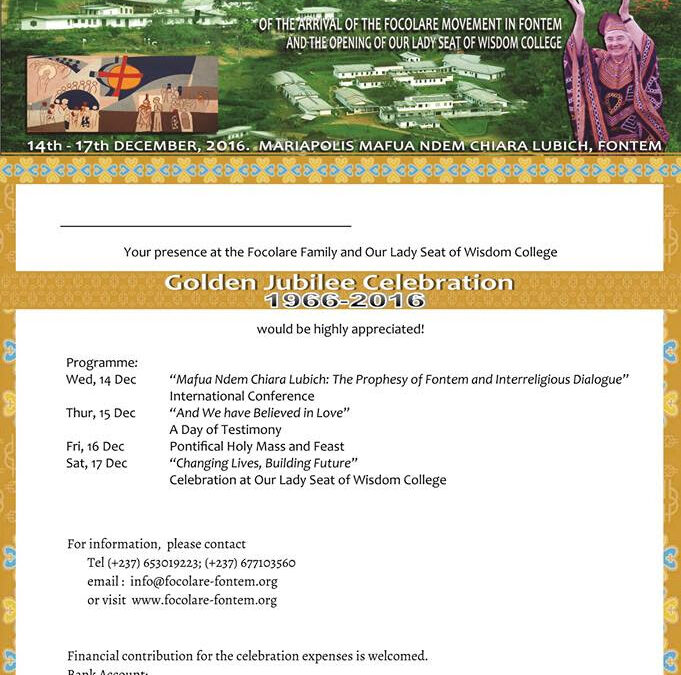
Sep 1, 2016 | Non categorizzato
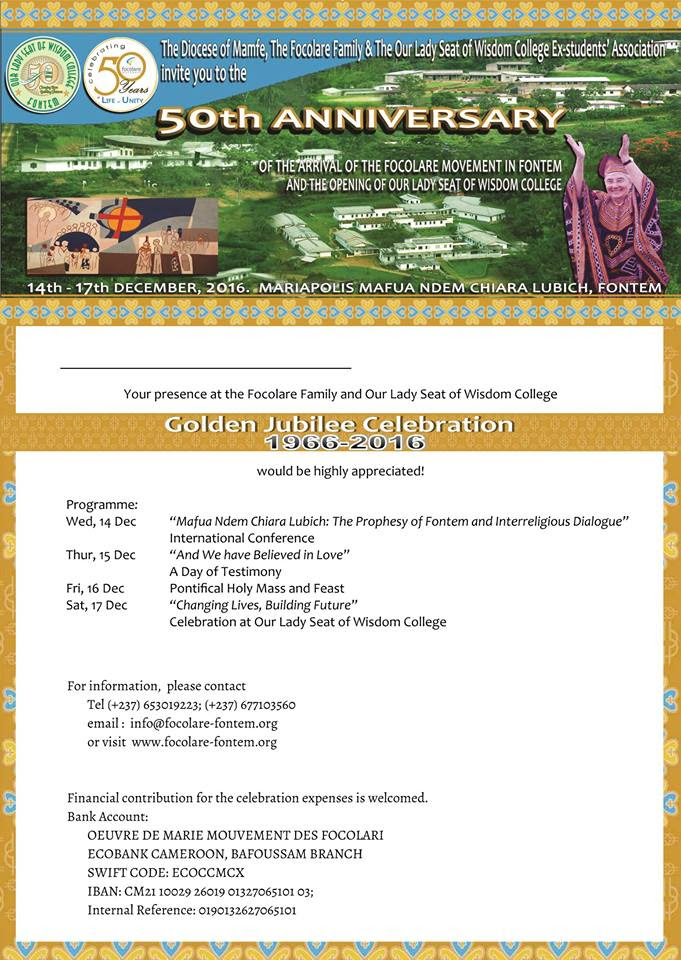 The diocese of Mamfe, the Focolare family and the Alumni Association of the school, “Our Lady Seat of Wisdom,” are extending an invitation to all for the 50th anniversary celebration (1966-2016) of the arrival of the Focolare Movement in Fontem (Camerun) and the opening of the school. The celebrations will be held at the “Mariapolis Mafua Ndem Chiara Lubich” (Fontem) from 14 to 17 December 2016. For information: info@focolare-fontem.org Web site: www.focolare-fontem.org
The diocese of Mamfe, the Focolare family and the Alumni Association of the school, “Our Lady Seat of Wisdom,” are extending an invitation to all for the 50th anniversary celebration (1966-2016) of the arrival of the Focolare Movement in Fontem (Camerun) and the opening of the school. The celebrations will be held at the “Mariapolis Mafua Ndem Chiara Lubich” (Fontem) from 14 to 17 December 2016. For information: info@focolare-fontem.org Web site: www.focolare-fontem.org
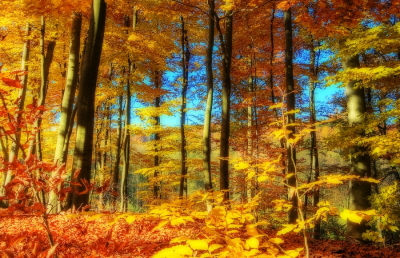
Sep 1, 2016 | Non categorizzato
 Just as Jesus had immediately inserted himself into the sub-layer of society by being born in a stable amongst the homeless, the refugees, the banished; so too, by allowing himself to be crucified and abandoned, he stood in the midst of the massive crowd of all those who suffer: the oppressed, the discouraged, the hungry and the defeated of every age. His focus on all those in misery gives humankind the measure of his love, and was nothing but the logical consequence of having completely fit himself into humanity’s brokenness. It was his way to make himself the last, the vilest of creatures, the most degraded – the way for to be at the root of all misery, a root that raises to Heaven. Infinity empties itself out of love. He had created the universe, developed and ruled it. The universe represents the production of something of boundless grandeur, somehow proportionate to the greatness of his mind, a world made of worlds, one more wondrous than the next. And humankind – tiny creatures on one small planet – after centuries of studying has only a minuscule idea of all that the universe contains: with stars that in our galaxy alone are four light-years apart and from the edges of the galaxy to its centre span a distance of 30 light-years which they can cover back and forth only 1,500 times in a billion years. In this universe that is infinitely too great for the human mind to fathom, he had also taken note of the misery of the human organisms on planet earth, and emptied himself in order to become one of them. He helped them to the point of giving them the Gospel and his very Self in the form of Food. The Redemption re-establishes the design of Creation, which includes that the existence of the stars and the atoms of the universe and the creatures of earth be in constant harmony for the realization of unity. This is why the Creator breathed into it the breath of life that is love. Health, peace and welfare flower in accordance with this precept. (Igino Giordani, L’unico amore, (Rome: Città Nuova, 1974) p. 64 and 105
Just as Jesus had immediately inserted himself into the sub-layer of society by being born in a stable amongst the homeless, the refugees, the banished; so too, by allowing himself to be crucified and abandoned, he stood in the midst of the massive crowd of all those who suffer: the oppressed, the discouraged, the hungry and the defeated of every age. His focus on all those in misery gives humankind the measure of his love, and was nothing but the logical consequence of having completely fit himself into humanity’s brokenness. It was his way to make himself the last, the vilest of creatures, the most degraded – the way for to be at the root of all misery, a root that raises to Heaven. Infinity empties itself out of love. He had created the universe, developed and ruled it. The universe represents the production of something of boundless grandeur, somehow proportionate to the greatness of his mind, a world made of worlds, one more wondrous than the next. And humankind – tiny creatures on one small planet – after centuries of studying has only a minuscule idea of all that the universe contains: with stars that in our galaxy alone are four light-years apart and from the edges of the galaxy to its centre span a distance of 30 light-years which they can cover back and forth only 1,500 times in a billion years. In this universe that is infinitely too great for the human mind to fathom, he had also taken note of the misery of the human organisms on planet earth, and emptied himself in order to become one of them. He helped them to the point of giving them the Gospel and his very Self in the form of Food. The Redemption re-establishes the design of Creation, which includes that the existence of the stars and the atoms of the universe and the creatures of earth be in constant harmony for the realization of unity. This is why the Creator breathed into it the breath of life that is love. Health, peace and welfare flower in accordance with this precept. (Igino Giordani, L’unico amore, (Rome: Città Nuova, 1974) p. 64 and 105

Aug 31, 2016 | Focolare Worldwide, Senza categoria
 “An unexpected phone call came one early morning. My elder brother’s voice at the other end of the line sounded confused. My nephew had just met an accident. He had been about to pick up my brother from work, but while driving he had dozed off, and those few seconds were enough for him to hit a motorcycle and kill two of his colleagues. They were both married men with families. It was indeed a shock for me; it was so heartbreaking. I went to look for my nephew. He was in a prison cell. I didn’t know what to say; I could only cry with him. Since it was early morning and my nephew and the other detainees had not yet had breakfast, I went to buy some food for them. Then I asked the prison guard if it was possible to clean the prison cell which was quite dirty. When my brother arrived and started crying, I stayed to comfort him. At this point, I realized that our next step had to be to ask for forgiveness from the families of the two victims. I told my brother that we should go to their wakes, face their families and ask for their forgiveness. My brother agreed, overcoming his own fear. We went to see the first family … and we went straight to the widow, who was crying. She was indeed quite angry with my brother. I felt I had to be there to absorb all her pain. Then I embraced her and said, ‘We are here to ask your forgiveness for what happened, without expecting to be forgiven.’ Then we also had to ask forgiveness from the victim’s parents. Their relatives advised us not to, because they were afraid that his mother would lose her calm and be beside herself with anger. But I strongly felt that we had to do it. I approached the mother, with my brother close behind me. Indeed, she cried aloud as I entrusted everything silently to God and embraced her tightly asking her to forgive us, also on behalf of my nephew. I assured her that if we would have found the way to take care of their family, providing for the education of the three daughters who were still in grade school. I was profoundly experiencing the pain and sorrow of t family, but at the same time, I fully experienced that peace that only God can give. Before leaving, we went to say goodbye to the widow. She did not say anything to my brother; but she did introduce me to her three daughters. This consoled me since I considered it an indication that I was able to establish some kind of a relationship with her. Some days later, with some friends from the Focolare, I attended the funeral… and also visited the family of the other victim. My nephew was released from detention three weeks later. A case was filed against him, but after several court hearings, the two families agreed to drop the case upon monetary compensation. My brothers and sisters pooled together the money that they had and we were able to offer monetary assistance to the families involved. This made our family more united, having helped one another. A year later, I thought of getting in touch with a widow of the accident victim. To my surprise she said, “I want to apologize for how I treated you and your brother when you came to the wake of my husband.” Since then we became friends… I was able to share about my faith in the love of God. Then I started sending her the daily ‘password’, a Gospel reflection to live by, which she now sends to all her friends. Two months ago, she invited me to a family gathering to celebrate her eldest daughter’s elementary school graduation. My heartbeat was galloping so fast at the party because I realized that all of them knew who I was—the aunt of the person who had caused the accident. The widow was with me the whole time, sharing with me beautiful memories of her husband. During a Mariapolis, at which she was present, she said, “You know, now I understand why God permitted everything that happened. Were it not for that accident, I would never have met you and the Focolare which has made a big change in my life.” She added that she had become closer to God. I thought this was my opportunity to ask her, “If you would meet my nephew someday, could you forgive him?” She answered, ‘I have already forgiven him. Look at my face. There are no traces of hatred for your nephew and your family.’ I felt that it was indeed an enormous grace to be a recipient of God’s mercy, and through his grace, to be also capable of offering it to one another.”
“An unexpected phone call came one early morning. My elder brother’s voice at the other end of the line sounded confused. My nephew had just met an accident. He had been about to pick up my brother from work, but while driving he had dozed off, and those few seconds were enough for him to hit a motorcycle and kill two of his colleagues. They were both married men with families. It was indeed a shock for me; it was so heartbreaking. I went to look for my nephew. He was in a prison cell. I didn’t know what to say; I could only cry with him. Since it was early morning and my nephew and the other detainees had not yet had breakfast, I went to buy some food for them. Then I asked the prison guard if it was possible to clean the prison cell which was quite dirty. When my brother arrived and started crying, I stayed to comfort him. At this point, I realized that our next step had to be to ask for forgiveness from the families of the two victims. I told my brother that we should go to their wakes, face their families and ask for their forgiveness. My brother agreed, overcoming his own fear. We went to see the first family … and we went straight to the widow, who was crying. She was indeed quite angry with my brother. I felt I had to be there to absorb all her pain. Then I embraced her and said, ‘We are here to ask your forgiveness for what happened, without expecting to be forgiven.’ Then we also had to ask forgiveness from the victim’s parents. Their relatives advised us not to, because they were afraid that his mother would lose her calm and be beside herself with anger. But I strongly felt that we had to do it. I approached the mother, with my brother close behind me. Indeed, she cried aloud as I entrusted everything silently to God and embraced her tightly asking her to forgive us, also on behalf of my nephew. I assured her that if we would have found the way to take care of their family, providing for the education of the three daughters who were still in grade school. I was profoundly experiencing the pain and sorrow of t family, but at the same time, I fully experienced that peace that only God can give. Before leaving, we went to say goodbye to the widow. She did not say anything to my brother; but she did introduce me to her three daughters. This consoled me since I considered it an indication that I was able to establish some kind of a relationship with her. Some days later, with some friends from the Focolare, I attended the funeral… and also visited the family of the other victim. My nephew was released from detention three weeks later. A case was filed against him, but after several court hearings, the two families agreed to drop the case upon monetary compensation. My brothers and sisters pooled together the money that they had and we were able to offer monetary assistance to the families involved. This made our family more united, having helped one another. A year later, I thought of getting in touch with a widow of the accident victim. To my surprise she said, “I want to apologize for how I treated you and your brother when you came to the wake of my husband.” Since then we became friends… I was able to share about my faith in the love of God. Then I started sending her the daily ‘password’, a Gospel reflection to live by, which she now sends to all her friends. Two months ago, she invited me to a family gathering to celebrate her eldest daughter’s elementary school graduation. My heartbeat was galloping so fast at the party because I realized that all of them knew who I was—the aunt of the person who had caused the accident. The widow was with me the whole time, sharing with me beautiful memories of her husband. During a Mariapolis, at which she was present, she said, “You know, now I understand why God permitted everything that happened. Were it not for that accident, I would never have met you and the Focolare which has made a big change in my life.” She added that she had become closer to God. I thought this was my opportunity to ask her, “If you would meet my nephew someday, could you forgive him?” She answered, ‘I have already forgiven him. Look at my face. There are no traces of hatred for your nephew and your family.’ I felt that it was indeed an enormous grace to be a recipient of God’s mercy, and through his grace, to be also capable of offering it to one another.”
M.R.
New City (Philippines)
![Collegamento CH Worldwide linkup]()
Aug 30, 2016 | Non categorizzato
 The news summary will be made available on the Collegamento CH website a few days before the Internet transmission. On the same website one can find all the previous linkups in various languages, as full editions as well as individual news video clips. Watch spot video
The news summary will be made available on the Collegamento CH website a few days before the Internet transmission. On the same website one can find all the previous linkups in various languages, as full editions as well as individual news video clips. Watch spot video
Aug 30, 2016 | Focolare Worldwide
- From 7- 17 September for Latin America, North America and Oceania
- From 28 September – 8 October for Africa, Asia and the Middle East
- From 15 – 23 October for Europe
Around a hundred participants will attend every session (Castel Gandolfo Mariapolis Centre, Rome), with a program partly in common and another part with various themes based on the demands and needs of each geographic area. The themes to be discussed will range from enculturation in Africa to the emergency of refugees and dialogue with Islam in Europe; other topics will focus on the challenges in Latin America, Asia, the Middle East, North America and Oceania in the social and ecclesiastic fields, from the perspectives of the family, the new generations, ecumenical and interreligious dialogue, and many other themes.
Aug 30, 2016 | Focolare Worldwide
- From 7- 17 September for Latin America, North America and Oceania
- From 28 September – 8 October for Africa, Asia and the Middle East
- From 15 – 23 October for Europe
Around a hundred participants will attend every session (Castel Gandolfo Mariapolis Centre, Rome), with a program partly in common and another part with various themes based on the demands and needs of each geographic area. The themes to be discussed will range from inculturation in Africa to the emergency of refugees and dialogue with Islam in Europe; other topics will focus on the challenges in Latin America, Asia, the Middle East, North America and Oceania in the social and ecclesiastic fields, from the perspectives of the family, the new generations, ecumenical and interreligious dialogue, and many other themes.
Aug 30, 2016 | Focolare Worldwide
- From 7- 17 September for Latin America, North America and Oceania
- From 28 September – 8 October for Africa, Asia and the Middle East
- From 15 – 23 October for Europe
Around a hundred participants will attend every session (Castel Gandolfo Mariapolis Centre, Rome), with a program partly in common and another part with various themes based on the demands and needs of each geographic area. The themes to be discussed will range from enculturation in Africa to the emergency of refugees and dialogue with Islam in Europe; other topics will focus on the challenges in Latin America, Asia, the Middle East, North America and Oceania in the social and ecclesiastic fields, from the perspectives of the family, the new generations, ecumenical and interreligious dialogue, and many other themes.
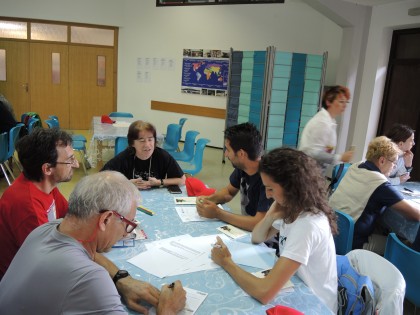
Aug 30, 2016 | Focolare Worldwide
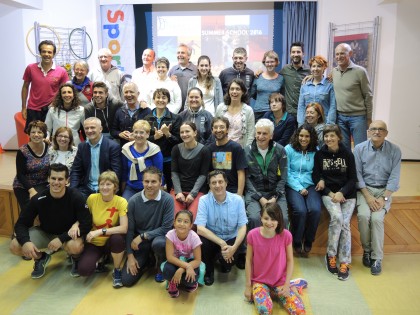 “Sport and Nature” was the title chosen for the 2016 Summer School organized by Sportmeet which gathered sport players from around the world to reflect on the environmental crisis and the specific contribution that sport could make to developing an authentic ecological conscience. Sport holds a great potential for creating friendship among peoples and with the Creation. It also has important educational value when practiced in the name of altruism and reciprocity. Eighty-three people attended the summer school: players at a variety of levels, ages and disciplines, leaders, physical education teachers and professional trainers, as well as others involved in sport as recreation. Paolo Cipolli, international coordinator of Sportmeet, presented the past and present history of the project. His presented had been preceded by numerous greetings from the public authorities who were present including Vice-Mayor Križevci Tomislav Katanović, Vice-President of the City Councill and ex-federal handball instructor, Ivan Pal, Deputy Minister off Science, Training and Sport, Hrvoje Šlezak from the Swiss Embassy in Croatia, Stefan Estermann, Second Secretary to the Italian Ambassador in Croatia whose greetings were given by Anna Lisa Gasparini and Zdenko Horvat.
“Sport and Nature” was the title chosen for the 2016 Summer School organized by Sportmeet which gathered sport players from around the world to reflect on the environmental crisis and the specific contribution that sport could make to developing an authentic ecological conscience. Sport holds a great potential for creating friendship among peoples and with the Creation. It also has important educational value when practiced in the name of altruism and reciprocity. Eighty-three people attended the summer school: players at a variety of levels, ages and disciplines, leaders, physical education teachers and professional trainers, as well as others involved in sport as recreation. Paolo Cipolli, international coordinator of Sportmeet, presented the past and present history of the project. His presented had been preceded by numerous greetings from the public authorities who were present including Vice-Mayor Križevci Tomislav Katanović, Vice-President of the City Councill and ex-federal handball instructor, Ivan Pal, Deputy Minister off Science, Training and Sport, Hrvoje Šlezak from the Swiss Embassy in Croatia, Stefan Estermann, Second Secretary to the Italian Ambassador in Croatia whose greetings were given by Anna Lisa Gasparini and Zdenko Horvat.  During the three-day course experts and instructors offered their reflections on the theme: “Sport and Nature: A Discovery, Resource and Challenge”. Andrea Ceciliani from the University of Bologna offered an exciting hand-on workshop. Mirna Andrijasević from Zagabria University presented “Sport in Nature: A Lifestyle.” Ivan Prskalo from Zagabria University presented Ecology and Chinesiology in Križevci presented an entertaining hands-on workshop on traditional Croatian games. Andrea Ceciliani from University of Bologna presented “Outdoor Education” showing how to hold school in the open, which was accompanied by a lively hands-on workshop. There were also school trips to Mount Kalnik and to Lake Čabraj along with an evening for sharing best practices with the Sportmeet Network, which included a telephone link-up with Rio de Janeiro and Belgrade. The last day began with a video conference that had been held by Focolare foundress Chiara Lubich at the United Nations in 1986 on the theme of Fraternity Among People and Nations. This was followed by a long and lively discussion with all the participants, and it helped design the plans for the upcoming Summer School in Barcelona, Spain, June 2017. Source: Sportmeet online
During the three-day course experts and instructors offered their reflections on the theme: “Sport and Nature: A Discovery, Resource and Challenge”. Andrea Ceciliani from the University of Bologna offered an exciting hand-on workshop. Mirna Andrijasević from Zagabria University presented “Sport in Nature: A Lifestyle.” Ivan Prskalo from Zagabria University presented Ecology and Chinesiology in Križevci presented an entertaining hands-on workshop on traditional Croatian games. Andrea Ceciliani from University of Bologna presented “Outdoor Education” showing how to hold school in the open, which was accompanied by a lively hands-on workshop. There were also school trips to Mount Kalnik and to Lake Čabraj along with an evening for sharing best practices with the Sportmeet Network, which included a telephone link-up with Rio de Janeiro and Belgrade. The last day began with a video conference that had been held by Focolare foundress Chiara Lubich at the United Nations in 1986 on the theme of Fraternity Among People and Nations. This was followed by a long and lively discussion with all the participants, and it helped design the plans for the upcoming Summer School in Barcelona, Spain, June 2017. Source: Sportmeet online
See also: Sportmeet in the Balkans: When Sports Unites
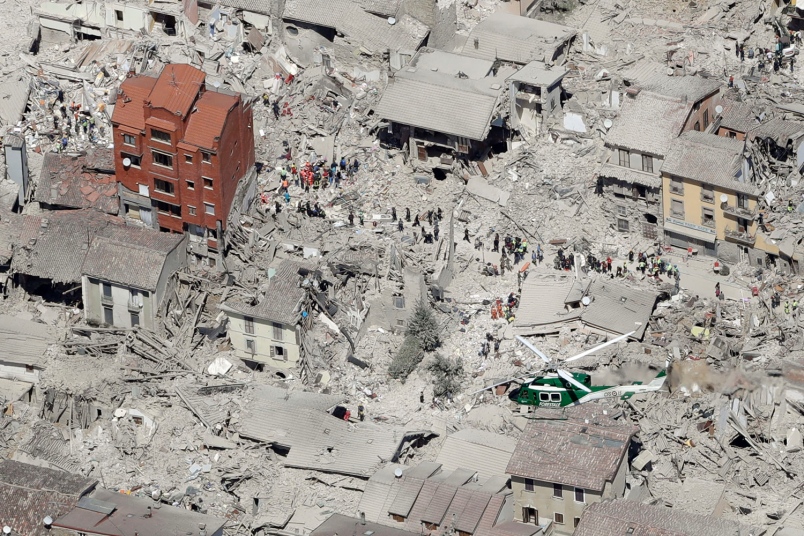
Aug 29, 2016 | Non categorizzato
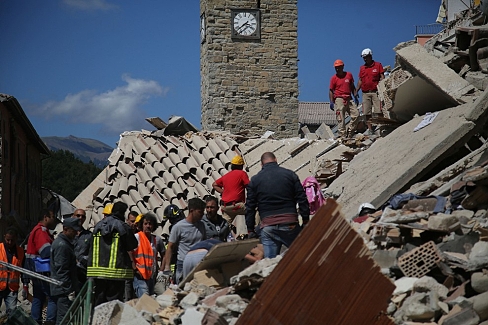 That clock tower on Amatrice church indicating 3:36 am is a powerful image for what happened this night. That minute was the last minute for many victims, it will be a minute forever remembered because it is written in the flesh and hearts of their families. And it will be remembered by our country, whose recent history is also a series of clocks stopped forever by the violence of men and of the earth. I will also remember it forever, because this cry of the earth also reached the house of my parents in Roccafluvione, around twenty kilometres from Arquata del Tronto, where I am visiting them. It was a long night of fear, suffering and thoughts for Amatrice, Arquata, Accumuli, towns of my childhood, close to where my grandparents come from, villages where I would accompany my father as he went about his business selling chickens. And then there were thoughts, thoughts we never have, because you can only have them on these terrible nights. I thought about all the time that clock had measured right up until 3.36. It stopped there, dead, but it was only one dimension of time which the Greeks called ‘kronos’: the surface, the soil of time. In the world there is our managed time, domesticated, constructed, which live by. But beneath it there is a another time: the time of the earth. This non-human time, and at times inhuman, and commands the time of men, mothers and children. And I thought that we are not the masters of this other time, which is deeper, abysmal, primitive, which doesn’t follow our path, and at times is against the paths of those who walk above. On such momentous nights we become aware of this different time, on which we walk and build our homes, and that we are ‘grass of the field’, watered and nourished by the sky, but also swallowed up by the earth.
That clock tower on Amatrice church indicating 3:36 am is a powerful image for what happened this night. That minute was the last minute for many victims, it will be a minute forever remembered because it is written in the flesh and hearts of their families. And it will be remembered by our country, whose recent history is also a series of clocks stopped forever by the violence of men and of the earth. I will also remember it forever, because this cry of the earth also reached the house of my parents in Roccafluvione, around twenty kilometres from Arquata del Tronto, where I am visiting them. It was a long night of fear, suffering and thoughts for Amatrice, Arquata, Accumuli, towns of my childhood, close to where my grandparents come from, villages where I would accompany my father as he went about his business selling chickens. And then there were thoughts, thoughts we never have, because you can only have them on these terrible nights. I thought about all the time that clock had measured right up until 3.36. It stopped there, dead, but it was only one dimension of time which the Greeks called ‘kronos’: the surface, the soil of time. In the world there is our managed time, domesticated, constructed, which live by. But beneath it there is a another time: the time of the earth. This non-human time, and at times inhuman, and commands the time of men, mothers and children. And I thought that we are not the masters of this other time, which is deeper, abysmal, primitive, which doesn’t follow our path, and at times is against the paths of those who walk above. On such momentous nights we become aware of this different time, on which we walk and build our homes, and that we are ‘grass of the field’, watered and nourished by the sky, but also swallowed up by the earth.  The earth, the real one and not the romantic and naive one of ideologies, is both mother and stepmother. The hummus generates man but also turns him back into dust, sometimes in a good way at the right time, but other times it is bad, and too soon, with a so much suffering. Biblical humanism knows this very well, but for this has fought a lot with the pagan cults of local peoples who wanted to make a divinity of the earth and its nature: the power of the earth has always fascinated men who have tried to ‘buy’ it with magic and sacrifices. Whilst I tried in vain to go back to sleep, I thought about the tremendous books of Job and Qohelet, which you can understand on such nights. Those books tell us that no God, not even the real one, can control the earth, because He too, once he entered into human history, became a victim of the mysterious freedom of his creation. God cannot even explain to us why children die squashed beneath the ancient pillars of our towns. He can’t explain it to us because if he knew why he would be a monstrous idol. God, who today looks on the land of the three As – Arquata, Accumuli and Amatrice – can only ask himself the same questions as us: he can cry out, remain silent, cry together with us. He can perhaps remind us with the words of the Bible that all is vanity of vanities: everything is breath, wind, mist, waste, nothing, ephemeral. Vanity in Hebrew is written Habel, the same word as Abel, the brother killed by Kane. Everything is vanity, everything is an infinite Abel: the world is full of victims. This we know. We know it, we forget it too often. These terrible nights and days make us remember. * 1 Kings 19:11
The earth, the real one and not the romantic and naive one of ideologies, is both mother and stepmother. The hummus generates man but also turns him back into dust, sometimes in a good way at the right time, but other times it is bad, and too soon, with a so much suffering. Biblical humanism knows this very well, but for this has fought a lot with the pagan cults of local peoples who wanted to make a divinity of the earth and its nature: the power of the earth has always fascinated men who have tried to ‘buy’ it with magic and sacrifices. Whilst I tried in vain to go back to sleep, I thought about the tremendous books of Job and Qohelet, which you can understand on such nights. Those books tell us that no God, not even the real one, can control the earth, because He too, once he entered into human history, became a victim of the mysterious freedom of his creation. God cannot even explain to us why children die squashed beneath the ancient pillars of our towns. He can’t explain it to us because if he knew why he would be a monstrous idol. God, who today looks on the land of the three As – Arquata, Accumuli and Amatrice – can only ask himself the same questions as us: he can cry out, remain silent, cry together with us. He can perhaps remind us with the words of the Bible that all is vanity of vanities: everything is breath, wind, mist, waste, nothing, ephemeral. Vanity in Hebrew is written Habel, the same word as Abel, the brother killed by Kane. Everything is vanity, everything is an infinite Abel: the world is full of victims. This we know. We know it, we forget it too often. These terrible nights and days make us remember. * 1 Kings 19:11
Aug 28, 2016 | Non categorizzato, Word of
We can bring all things as a gift to God, if we learn how to rejoice with those who rejoice and to weep with those who weep, transforming each pain into love. The setting of these words is the Christian community in Corinth. It was extremely lively, full of initiative, animated by groups linked to different charismatic leaders. This also gave rise to tensions among individuals and groups, to divisions, personality cults, the desire to dominate. Paul intervened decisively and reminded everyone that, in the richness and variety of gifts and leaders belonging to the community, something much deeper bound them in unity: belonging to God. Once more the great Christian proclamation rings out: God is with us, and we are not lost, orphaned, abandoned to ourselves, but, as God’s children, we are God’s. As a true Father God cares for each one, without letting us lack anything we need for our good. Indeed, God is superabundant in love and in giving, as Paul affirms: ‘The world, life, death, the present, the future—all belong to you!’ God has even given us his Son, Jesus. What huge trust on God’s part in giving each thing into our hands! How often instead have we abused his gifts! We have believed ourselves to be the lords of creation to the point of plundering and despoiling it, lords of our brothers and sisters to the point of enslaving and slaughtering them, lords of our own lives to the point of wasting them in narcissism and self- destruction. God’s huge gift – ‘All belong to you’ – asks for gratitude. Often we complain about what we don’t have and we only turn to God to ask. Why don’t we look around and discover the beauty and the goodness surrounding us? Why don’t we say thank you to God for what he gives us each day? This ‘All belong to you’ is also a responsibility. It demands our attention, our tenderness, our care for all that has been entrusted to us: the whole world and every human being, the same care that Jesus has for us (‘you belong to Christ’), the same care that the Father has for Jesus (‘Christ belongs to God’). We ought to know how to rejoice with those who rejoice and to weep with those who weep, ready to gather up every groan, division, pain, violence, as something that belongs to us, so as to share it, to the point of transforming it into love. Everything has been given to us so that we bring it to Christ, that is, to the fullness of life, and to God, that is, to its final goal, giving back the dignity and the deepest meaning that belong to each thing and to each person. One day in the summer of 1949, Chiara Lubich sensed such a unity with Christ that she felt bound to him as a bride to her Spouse. This led her to think of the dowry she would bring, and she understood that it should be the whole of creation! On his side, he would bring her as his inheritance the whole of Paradise. She remembered then the words of the psalm: ‘Ask of me, and I will make the nations your heritage, and the ends of the earth your possession.’ (Ps 2:8) And she commented: ‘And we believed and we asked and He gave us all things that we may bring them to Him and He will give us Heaven: we the created, He the Uncreated.’ Towards the end of her life, speaking of the Movement to which she had given life and in which she saw herself reflected, Chiara Lubich wrote: ‘What, just now, would be my last wish? I wish that the Work of Mary [that is, the Focolare Movement], at the end of the ages, when it will be waiting, united, to appear before Jesus forsaken and risen, may be able to repeat to him, making its own the words of the Belgian theologian Jacques Leclercq, words I always find moving: “On your day, my God, I shall come to you…. I shall come to you, my God … with my wildest dream: to bring you the world in my arms.” ’1 Fabio Ciardi 1 Essential Writings, (London and New York: New City and New City Press, 2007), p. 369.
American English version of the Word of Life
Subscribe to the monthly Word of Life in English

 The diocese of Mamfe, the Focolare family and the Alumni Association of the school, “Our Lady Seat of Wisdom,” are extending an invitation to all for the 50th anniversary celebration (1966-2016) of the arrival of the Focolare Movement in Fontem (Camerun) and the opening of the school. The celebrations will be held at the “Mariapolis Mafua Ndem Chiara Lubich” (Fontem) from 14 to 17 December 2016. For information: info@focolare-fontem.org Web site: www.focolare-fontem.org
The diocese of Mamfe, the Focolare family and the Alumni Association of the school, “Our Lady Seat of Wisdom,” are extending an invitation to all for the 50th anniversary celebration (1966-2016) of the arrival of the Focolare Movement in Fontem (Camerun) and the opening of the school. The celebrations will be held at the “Mariapolis Mafua Ndem Chiara Lubich” (Fontem) from 14 to 17 December 2016. For information: info@focolare-fontem.org Web site: www.focolare-fontem.org






 That clock tower on Amatrice church indicating 3:36 am is a powerful image for what happened this night. That minute was the last minute for many victims, it will be a minute forever remembered because it is written in the flesh and hearts of their families. And it will be remembered by our country, whose recent history is also a series of clocks stopped forever by the violence of men and of the earth. I will also remember it forever, because this cry of the earth also reached the house of my parents in Roccafluvione, around twenty kilometres from Arquata del Tronto, where I am visiting them. It was a long night of fear, suffering and thoughts for Amatrice, Arquata, Accumuli, towns of my childhood, close to where my grandparents come from, villages where I would accompany my father as he went about his business selling chickens. And then there were thoughts, thoughts we never have, because you can only have them on these terrible nights. I thought about all the time that clock had measured right up until 3.36. It stopped there, dead, but it was only one dimension of time which the Greeks called ‘kronos’: the surface, the soil of time. In the world there is our managed time, domesticated, constructed, which live by. But beneath it there is a another time: the time of the earth. This non-human time, and at times inhuman, and commands the time of men, mothers and children. And I thought that we are not the masters of this other time, which is deeper, abysmal, primitive, which doesn’t follow our path, and at times is against the paths of those who walk above. On such momentous nights we become aware of this different time, on which we walk and build our homes, and that we are ‘grass of the field’, watered and nourished by the sky, but also swallowed up by the earth.
That clock tower on Amatrice church indicating 3:36 am is a powerful image for what happened this night. That minute was the last minute for many victims, it will be a minute forever remembered because it is written in the flesh and hearts of their families. And it will be remembered by our country, whose recent history is also a series of clocks stopped forever by the violence of men and of the earth. I will also remember it forever, because this cry of the earth also reached the house of my parents in Roccafluvione, around twenty kilometres from Arquata del Tronto, where I am visiting them. It was a long night of fear, suffering and thoughts for Amatrice, Arquata, Accumuli, towns of my childhood, close to where my grandparents come from, villages where I would accompany my father as he went about his business selling chickens. And then there were thoughts, thoughts we never have, because you can only have them on these terrible nights. I thought about all the time that clock had measured right up until 3.36. It stopped there, dead, but it was only one dimension of time which the Greeks called ‘kronos’: the surface, the soil of time. In the world there is our managed time, domesticated, constructed, which live by. But beneath it there is a another time: the time of the earth. This non-human time, and at times inhuman, and commands the time of men, mothers and children. And I thought that we are not the masters of this other time, which is deeper, abysmal, primitive, which doesn’t follow our path, and at times is against the paths of those who walk above. On such momentous nights we become aware of this different time, on which we walk and build our homes, and that we are ‘grass of the field’, watered and nourished by the sky, but also swallowed up by the earth.